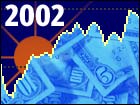|
Betting on a rebound
|
 |
December 28, 2001: 3:25 p.m. ET
The latest indicators point to an economic recovery in 2002. What’s that mean for stocks?
By Staff Writer Paul R. La Monica
|
NEW YORK (CNN/Money) - Has the economy finally turned the corner?
Friday's slew of reports showed that jobless claims rose at a lower level than expected, new home purchases are on the rise and that consumer confidence is up. Plus, history is on the economy's side: recessions typically last about 16 months, according to Anirvan Banerji, director of research for the Economic Cycle Research Institute. Since the recession officially began in March, the upturn should be in full swing by July 2002.
As conditions deteriorated earlier this year, investors flocked to so-called defensive issues, including food, health care and tobacco companies, the idea being that their profits can hold up even in a recession.
But now investors are looking ahead to better times and the companies that will lead the way.
Follow the leaders
After 11 interest rate cuts from the Federal Reserve this year, financials and retailers are poised to do well in 2002, with low rates boosting loan demand and consumer spending. Likewise, lower borrowing costs could help fuel large earnings gains for technology companies. And basic materials companies -- a group that includes paper and steel makers -- usually do well coming out of a recession, since a stronger economy leads to higher demand for raw materials, and hence higher prices.
That potential explains what's been going on in the stock market this quarter. The S&P Bank index is up 14 percent since Sept. 21; the S&P retail index is up 34 percent; the Nasdaq is up 39 percent; and the Dow Jones Basic Materials Index has gained 23 percent.
Meanwhile, the S&P Healthcare Index is trailing, up less than 11 percent. And tobacco and food companies, such as Philip Morris and Kellogg, are basically even with where they were three months ago.
Could be a pullback in the short-term
But the big upswing in the stocks of economically sensitive companies has led some to believe though that those sectors, while probably the best positioned for a recovery, are due for a pullback.
"The market is beginning to price in not only a significant recovery but a quick recovery. For that reason we think the market is vulnerable," says Todd Salamone, director of research for Schaeffer's Investment Research in Cincinnati.
In fact, some believe earnings estimates for the entire market are too high. Tobias Levkovich, senior institutional equity strategist for Salomon Smith Barney, is predicting 5 percent earnings growth for the S&P 500 in 2002, compared to the Thomson Financial/ First Call analyst consensus of 16 percent. And as first quarter results roll in, analysts could be inclined to slash their full-year projections -- bringing down stock prices in the process.
The tech sector is probably most vulnerable. Although analysts are predicting that tech sector earnings will increase by 47 percent in 2002, expectations for the first quarter are incredibly bleak, with an expected decline of 33 percent. Levkovich thinks technology earnings estimates for 2002 will come tumbling down once the first quarter results are reported.
Focus on financials and retail
That said, Levkovich thinks two sectors that traditionally lead an economic recovery should do relatively well in 2002: financials and retail.
Financials benefit immensely from a lower rate environment and stronger economy. Even though the financial sector has outperformed the broader market since the September lows, the stocks have not run up as much as other cyclical sectors.
And while consumers have certainly pulled back on their spending in the wake of this recession, Levkovich says there hasn't been a consumer collapse. So once the economy picks up, that should lead to even more robust levels of spending. All the ingredients for continued resiliency on the part of consumers are in place. "The issue is the four lowers: lower prices, lower energy costs, lower interest rates and lower taxes," Levkovich says. "These have all encouraged consumers to keep spending."
Salamone says select retailers will do well in 2002 but does not think a bet on the entire sector is a wise move. He thinks discount chains like Wal-Mart, Target, and Kohl's, which all reported healthy levels of holiday sales, should be relatively solid performers, while department store chains will continue to struggle.
Don't go overboard
Nonetheless, investors should keep in mind that a recovery does not necessarily mean a return to the go-go days of the mid- to late 1990s. Levkovich says that the economy should be "stronger" in 2002 but that does not necessarily mean it will be "strong".
And Banerji points out that even if the U.S. emerges from this downturn in 2002 that may not be enough to solve corporate profit woes since other large economies, including Japan and Germany, are also in the midst of recessions. That will make it difficult for big multi-nationals to post better earnings.
So even though a rebound in the stock market is likely, especially for cyclical sectors, investors should not expect stocks to move substantially higher in 2002. Levkovich refers to the 20 percent plus gains during the late 1990s as an "aberration." A more reasonable level of growth, says Levkovich is in the high single digits, or 10 percent if you're lucky.
Of course, after two years in a row of losses, that sounds pretty good. 
|
|
|
|
|
|

|

